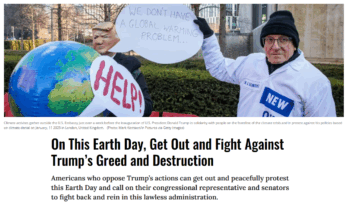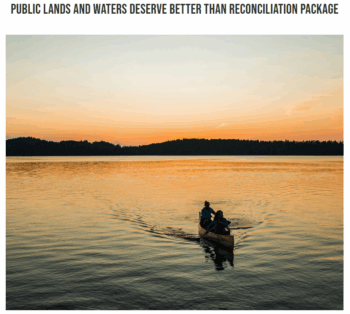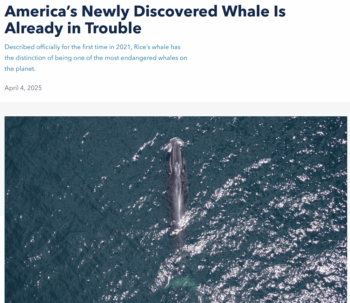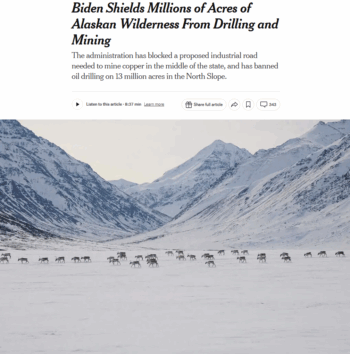Janine Jackson interviewed the Center for Biological Diversity’s Ashley Nunes about the selloff of public lands for the May 9, 2025, episode of CounterSpin. This is a lightly edited transcript.

Common Dreams (4/22/25)
Janine Jackson:
From lease sales to expedited permitting processes, the committee’s proposal creates an unprecedented pathway for developing our vast natural resources on federal lands and waters for generations to come.
That’s a response to a piece of the budget reconciliation bill making its way through Congress, and it comes from the American Petroleum Institute. So you can sense what’s up, and why our guest calls this piece of Republicans’ effort to fund Trump’s tax cuts for billionaires nothing more than opportunities for industry to plunder, profit and pollute.
Ashley Nunes is a specialist in public lands policy at the Center for Biological Diversity. She joins us now by phone. Welcome to CounterSpin, Ashley Nunes.
Ashley Nunes: Thank you, Janine. Good to be with you.

Outdoor Alliance (5/6/25)
JJ: Let’s timestamp ourselves. We’re recording on May 8, and this is about the House Natural Resources Committee, and their contribution to the Republican House Reconciliation Bill, that’s going to tell us how to offset the billionaire tax cuts that they want to push through. But it’s not a done deal yet, right?
AN: Right.
JJ: So it’s still in process. There are lots of implications, but what would this plan do, particularly with regard to–I could say public lands, but I really appreciate your phrase, “precious wild places.” What would this do?
AN: So as someone who’s focused on public lands policy, I am most interested in the part of the reconciliation package that’s come out of the House Natural Resources Committee. The proposed Republican budget hands over power to private industries to destroy our public lands and offshore waters. The excessive and indiscriminate development of fossil fuels, minerals and timber will harm wildlife and communities. This reckless development would undermine environmental protections. It would simply make air and water quality worse. And, of course, that’s harmful for wildlife and communities. So this budget wouldn’t just give tax breaks to billionaires, but it would give polluters the green light to raise emissions, destroy wild places and harm endangered species.
JJ: In particular, I know that you look at, for example, Alaska. We’re looking at oil leases in Alaska, we’re looking at Minnesota. There are very specific things, and I wonder if you could just lift up some examples for folks to know what we’re talking about.
AN: Absolutely. This is not an exhaustive list by any means, but I think I could do some highlights industry by industry.
JJ: Please.

NRDC (4/4/25)
AN: So let’s start with oil and gas on public lands. This bill would mandate dozens of lease sales every quarter, as you say, also sometimes in very sensitive locations, like the Arctic National Wildlife Refuge. There’s also at least 4 million acres on the coastal plains of Alaska for oil and gas, some of the most important bird breeding areas in the country, and really one of the last great wild places, not only in the Arctic, but in the world.
Then if we go to offshore waters for oil and gas, this bill would mandate six lease sales in Alaska’s Cook Inlet, and at least 30 lease sales in Gulf waters over the next 15 years. This offshore oil and gas development, when it pushes into sensitive ecosystems and deeper waters, it really risks another tragedy like the 2010 Deepwater Horizon explosion and oil spill that resulted in loss of human life and non-human life. The Gulf waters are home to the Rice’s whale, the world’s most endangered whale. So oil and gas here is really doing the most.
The other fossil fuel we’re mentioning is coal. This bill would open at least 4 million acres for new coal leasing. Coal is a dying and downright dirty industry, but this bill would have taxpayers subsidizing to keep that industry alive.
So across the board, there’s reduced royalty payments for these fossil fuel companies, for oil, gas and coal. And even though Republicans say that this is a bill intended to raise revenue, polluters get a really good deal here.

New York Times (4/19/24)
So that’s just fossil fuels. And if I could say a bit more, as you said, there’s also mining and timber. These are other extractive industries in the bill. So, mining: The bill undoes protections put in place by the Biden administration, it pushes through contentious mining projects, one of which you mentioned. So reversing a ban on 225,000 acres adjacent to Boundary Waters Wilderness in Minnesota, and then also a ban on a 211-mile mining road that would stretch across unspoiled wilderness in Alaska.
And then for timber, there’s a mandated 25% increase in timber production on public lands. And I fear this puts a target on the biggest and oldest trees, because of their economic value for timber. A bigger tree would produce more timber, but these are also the most ecologically valuable trees for carbon sequestration, habitat protection and wildfire resilience. So this is a huge giveaway to extractive industry that would be hugely harmful for the places we love.
JJ: And maybe to just pull it out a bit, this is opposing what communities want to do with their land, right? Land use is a local issue, and we hear hollering about states’ rights, but this is actually in opposition to what a number of places have said they want to do with their land.
AN: That’s right, Janine, and this is wonky, but there are many provisions, across the bill, that would take away environmental review. And that’s the process that allows the public to have their say, to give their input. So if Congress rubberstamps projects, the public doesn’t have that opportunity.
JJ: It’s so important. The fight to resist clean energy in this country is intense, and it’s also transparent. And those thumbprints are all over this as well. The fossil fuel companies, they’re following tobacco. They’re just going to hold onto it, to the very last penny. And that seems evident in this legislation.
AN: You’re so right. There are provisions, as I said, to reduce royalties on fossil fuels, and that’s the status quo. But there’s also provisions to add rents for clean energy, renewable energy on public lands. So this is really a giveaway to polluters, and it’s to the detriment of that clean energy transition that we need.
JJ: I’ll just ask you, finally: I think transparency is the least that reporters could demand from this process, that has such myriad implications. But what would you like to see from journalism on this set of issues? And maybe what would you like to see less of?

Ashley Nunes: “This budget proposal is one of the worst attacks on the environment that we have seen in our lifetime.”
AN: There’s just so much to say here, really. I think I would just say a couple of things.
First of all, we were warned that this would happen. This budget bill is the Project 2025 and Agenda 47 playbooks in action. It’s not just “drill, baby, drill,” it’s also “mine, baby, mine” and “log, baby, log.” This proposal uses public resources to enrich private interests. It’s extreme. And if these provisions stay in the reconciliation package, and are enacted, this would be an obscene giveaway of our public resources to private industry, and it would put these places at serious risk. It’s heartbreaking. I think journalists, like you and others, can help people understand what’s at stake.
So, secondly, I would just add that we are living through a climate crisis and an extinction crisis, and this budget proposal is one of the worst attacks on the environment that we have seen in our lifetime. It would not only cause harm to our cherished landscapes, coastal waters and wildlife, but also to our public health, and our ability to recreate on our public lands across the country. So people want to know what they can do, and ultimately, people need to call their congressional representatives and tell them to vote no, to stop.
JJ: We’ve been speaking with Ashley Nunes, public lands policy specialist at the Center for Biological Diversity. They’re online at BiologicalDiversity.org. Thank you so much, Ashley Nunes, for joining us this week on CounterSpin.
AN: Thanks, Janine.
This content originally appeared on FAIR and was authored by Janine Jackson.